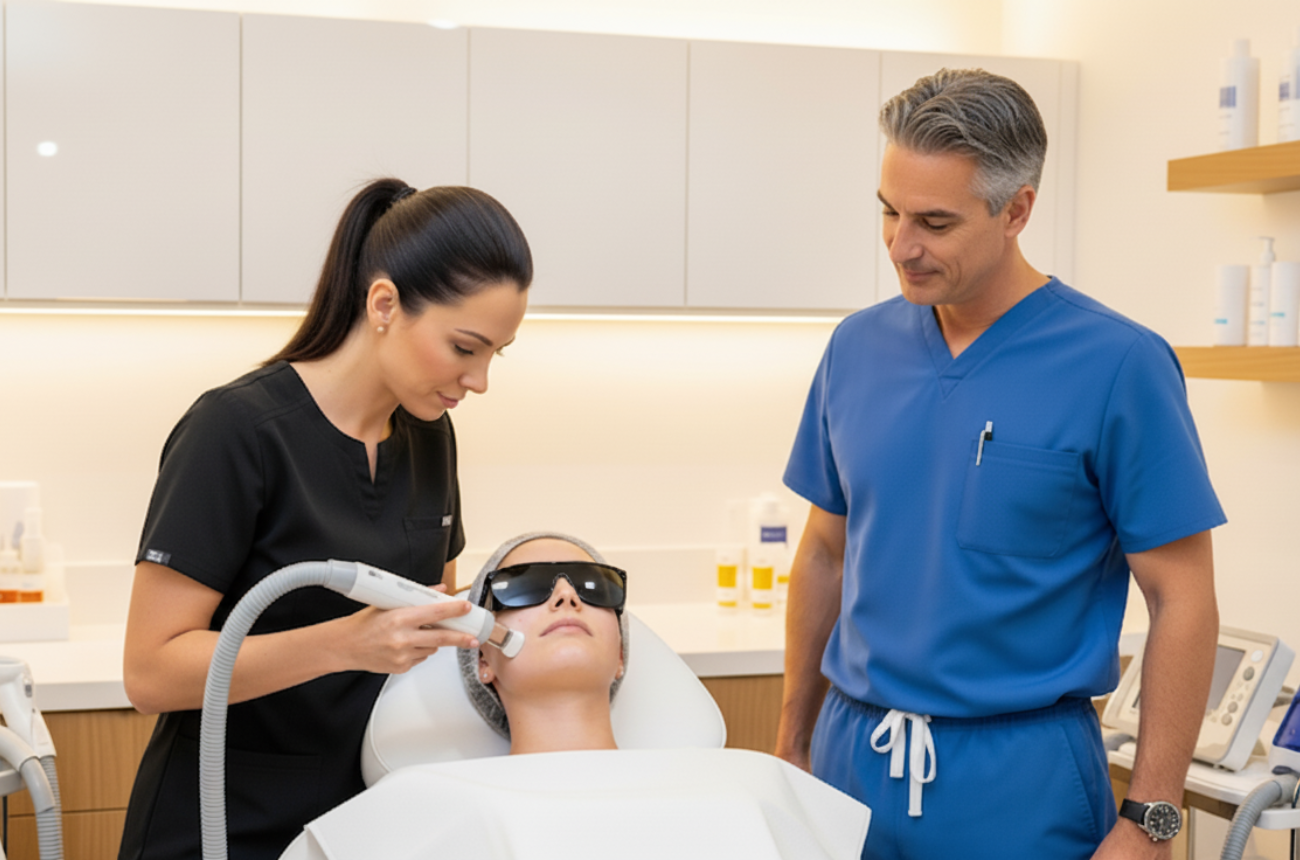In today’s evolving medical landscape, many general and aesthetic practices rely on team-based care. Nurses, physician assistants, and medical assistants often perform procedures under a physician’s supervision, but not all tasks can be delegated equally. Understanding delegation and scope of practice ensures your clinic operates safely, legally, and efficiently.
Let’s break down what you can (and can’t) delegate, and how technology like OptiMantra helps maintain compliance every step of the way.
Understanding Your Scope of Practice
Every licensed healthcare professional has a defined scope of practice—the range of clinical activities they’re legally permitted to perform based on their license, training, and state regulations.
For example:
- Physicians (MD/DO) can diagnose, prescribe, and perform medical procedures independently.
- Nurse Practitioners (NPs) and Physician Assistants (PAs) can evaluate, diagnose, and treat patients, though their level of independence varies by state.
- Registered Nurses (RNs) can perform certain medical tasks (such as injections) under a provider’s order or supervision.
- Medical Assistants (MAs) can handle non-invasive, supportive duties, but cannot diagnose, prescribe, or independently perform medical procedures.
In medical aesthetics, where treatments often blur the lines between cosmetic and medical care, these boundaries matter even more. Neurotoxin injections, laser treatments, and microneedling are considered medical procedures, meaning they must be performed by, or under the delegation of, a qualified medical professional.
Who Can Perform Injections?
Injectable medications—including vaccines, trigger point injections, or biologics—can be administered by qualified staff, but only under appropriate supervision.
In most states:
- Physicians, NPs, and PAs may inject independently.
- RNs may inject under provider orders.
- LPNs/LVNs may inject with specific training and supervision.
- MAs may not inject medications unless state law explicitly allows it (and typically only under direct supervision).
However, the supervising physician is ultimately responsible for patient safety and treatment outcomes. That means delegation should only occur when the provider is properly trained and competency has been verified and documented.
Who Can Perform Laser Treatments?
Laser hair removal, IPL, and skin resurfacing procedures fall under a complex mix of medical board and cosmetology regulations and can be performed by qualified staff, but only under appropriate medical supervision.
In most states:
- Physicians, NPs, and PAs may perform laser treatments independently.
- RNs may perform laser treatments under provider orders and supervision.
- LPNs/LVNs may perform treatments with documented training and under direct supervision.
- Laser technicians or aestheticians may only perform laser procedures if explicitly permitted by state law and typically under on-site physician or NP oversight.
Providers should ensure that anyone operating a laser has completed accredited training, understands device-specific protocols, and adheres to all safety standards. Clear supervision guidelines and thorough documentation help protect both patients and practitioners while maintaining compliance with state regulations.
Who Can Perform Treatments?
Procedures like microneedling, chemical peels, and other minimally invasive aesthetic treatments are considered medical in nature, meaning they can only be performed by, or under the delegation of, a licensed medical professional.
In most states:
- Physicians, NPs, and PAs may perform these procedures independently.
- RNs may perform them under provider orders and supervision.
- LPNs/LVNs may perform them with appropriate training and under direct supervision.
- Medical aestheticians or assistants may assist or perform certain procedures only if permitted by state law and under on-site medical supervision.
Because these procedures involve penetration of the skin or potential medical risks, providers must ensure all personnel are properly trained and credentialed. Each delegated procedure should have clear standing orders, documentation of competency, and adherence to device and safety protocols.
How to Delegate Safely
Effective delegation is both a compliance requirement and a leadership skill. Follow these best practices:
- Know Your State Laws: Each state defines delegation differently—review your medical and nursing board regulations regularly.
- Verify Competency: Document training, observe procedures, and record supervision dates.
- Establish Written Protocols: Include standing orders, consent forms, and emergency procedures.
- Maintain Clear Documentation: Record who performed each treatment and under whose supervision.
- Use Technology for Oversight: Platforms like OptiMantra can centralize permissions and streamline supervision workflows.
When implementing be sure to:
- Start small: Begin with basic procedures before allowing staff to perform complex treatments.
- Supervise actively: Observe and evaluate performance regularly until competency is fully established.
- Maintain clear communication: Set expectations, provide feedback, and encourage questions.
- Document everything: Record training, supervision, patient outcomes, and any incidents.
Delegation done correctly ensures safe, high-quality care while freeing up your time to focus on patient care, strategic growth, and expanding service offerings.
Keeping Oversight Simple with OptiMantra
OptiMantra simplifies compliance by centralizing everything your team needs in one platform.
Supervising physicians can:
- Assign permissions by role and license.
- Record supervision notes directly in patient charts.
- Monitor treatment activity and maintain transparent audit trails.
- Maintain detailed, time-stamped records for audits or credentialing.
With every treatment documented and every role clearly defined, your practice stays efficient, compliant, and well-coordinated.
Compliance Meets Growth
Delegation is the foundation of efficient, team-based care—but it comes with responsibility. Knowing who can inject, laser, or perform treatments under your oversight helps protect your patients, your staff, and your license. By defining clear roles, verifying training, and leveraging an integrated system like OptiMantra, you can protect your patients, your license, and your team.
Empower your team with confidence and compliance. Book a demo or sign-up for a free trial to see how OptiMantra helps practices manage procedures and staff oversight efficiently.
Disclosure: This article is for informational purposes only. Always verify scope and delegation rules with your state licensing board before implementing new procedures.





